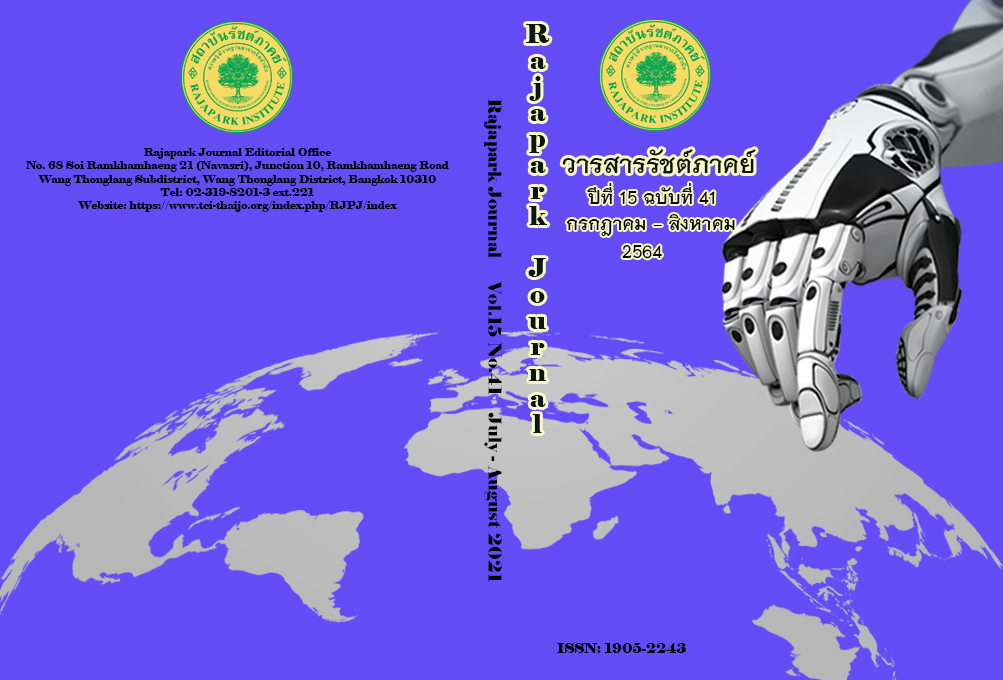Internal Auditing Standards of Finance Effects on the Credibility of Financial Reports of Schools under the Secondary Educational Service Area Office Bangkok
Main Article Content
Abstract
The objective of this research was to study the internal auditing standards of finance effects on the credibility of financial reports of schools under the Secondary Educational Service Area Office Bangkok. This study was a quantitative research. The samples were 150 school administrators. Descriptive statistics were used to describe the characteristics of the data obtained from the questionnaire, namely percentage, mean, and standard deviation, and multiple regressions were used for analysis for hypothesis testing. The findings were as follows: 1) internal auditing standards for finance overall and each aspect were at the highest level; 2) school financial report reliability overall and each aspect was at the highest level; and 3) the results of hypothesis tests for internal auditing standards of finance effects on the credibility of financial reports of schools were as follows: establishing an audit action plan, following-up, and improving the audit work positively affected on the credibility of financial reports regarding the accuracy of disbursement, the receipt and deposit, accounting records and concerning the reliability reports and financial statements, and timeliness. In addition, the audit report positively affected on the reliability of financial reports, accuracy of retention and remittance. Nevertheless, performing planned audit did not effect on the school's financial reporting credibility at a statistically significant level 0.05.
Article Details
Views and opinions appearing in the Journal it is the responsibility of the author of the article, and does not constitute the view and responsibility of the editorial team.
References
Boonsumlee, S. (2017). Internal Control Effect on Trust in School Financial Report in Area Office of Education Region 2. Master of Accountancy. Sripatum University.
Charoenphon, S. (2019). Effects of Internal Control System in Accounting and Finance on the Performance Efficiency of Accountants in the Service Industry in the Central Region. Master of Accountancy. Sripatum University.
Chatiwong, T. (2017). Accounting Theory Research: From the Past to the Future. Journal of Business Administration, The Association of Private Higher Education Institutions of Thailand, 6(2), 203-212.
Department of Social Development and Welfare, Internal Audit Group. (2017). Internal Auditing Standards and the Ethics of Internal Auditors of the Government. Retrieved December 26, 2020, from http://61.19.50.59/audit/Centers/View.aspx?id=153&type=1
Dokthien, W. (2017). Cooperative Auditing Standards for the Performance of Cooperative Savings in the Central Region. Master of Accountancy. Sripatum University.
Donaldson, L., & Davis, J. H. (1991). Stewardship Theory or Agency Theory: CEO Governance and Shareholder Returns. Australian Journal of Management, 16(1), 49-64.
Federation of Accounting Professionals Under the Royal Patronage of His Majesty the King. (2015). Framework Guide for Financial Reporting (Revised 2015). Retrieved December 10, 2020, from https://www.tfac.or.th/upload/9414/UW0ynKPwuW.pdf
Horvat, T., & Zvorc, B. (2017). The Impact of Internal Auditing on Financial Planning in Public Educational Institutions. MIC 2017: Managing the Global Economy; Proceedings of the Joint International Conference, Monastier di Treviso, Italy, May 24–27, 2017, University of Primorska Press. Pp. 529-541.
Injiem, V. (2006). Problems and Needs of Internal Auditors: Government Universities. Master of Education. King Mongkut’s University of Technology North Bangkok.
Jinasit, J., & Wechayaluck, N. (2014). A Study of Guidelines for Internal Audit of Secondary Educational Service Area Office. National and International Conference Interdisciplinary Research for Local Development Sustainabilty (IRLDS 2015), July 23, 2015, Nakhon Sawan Rajabhat University, Thailand. Pp. 197-205.
Ketasingha, W. (1995). Arithmetic Mean. Educational Research News, 18(3), 8-11.
Ministry of Education Thailand. (2020). Ministry of Education Government Regulations Act B.E. 2546 (2003). Retrieved November 18, 2020, from https://www.moe.go.th/backend/wp-content/uploads/2020/10/พรบ.-ศธ.-2546-ฉ1.pdf
Office of the Permanent Secretary Ministry of Commerce. (2020). Royal Decree on Rules and Procedures for Good Corporate Governance, B.E.2546 (2003). Retrieved November 18, 2020, from http://www.ops.moc.go.th/ewt_dl_link.php?nid=3930
Kaewsit, O. (2018). Quality of the Audit work that Affects the Success of the Operations of Companies Listed on the Stock Exchange of Thailand. Master of Accountancy. Sripatum University.
Sikum, P. (2017). The Influence of the Internal Audit Process and Risk Management on the Performance of Companies Listed on the Stock Exchange of Thailand. Master of Accountancy. Sripatum University.
Soma, R. (2017). Effects of Internal Audit Strategy on Operational Efficiency of Universities under the Commission on Higher Education. Humanities and Social Sciences Journal of Graduate School, Pibulsongkram Rajabhat University, 11(2), 162-173.
Thaokham, T. (2011). Guidelines for Accounting and Financial Internal Audit of Subdistrict Organization
Administrations in Mae Suai District, Chiang Rai Province. Master of Accounting. Chiang Mai University.
Tharaphrom, T. (2017). Financial Management in Educational Institutions. Retrieved December 6, 2020, from http://web.sesao8.go.th/sesao_backup/images/stories/Downloads/plan/29-08-60_01.pdf
The Comptroller General’s Department. (2003). Guidelines for Internal Audit. Retrieved December 26, 2020, from https://www.cgd.go.th/
Yamane, T. (1973). Statistic: An Introductory Analysis (3rd ed.). New York: Harper & Row.


